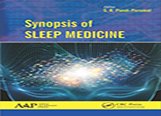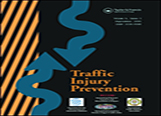Publications-28
| Polysomnography II: Scoring. | |
|
|
| POLYSOMNOGRAPHY I: PROCEDURE AND TECHNOLOGY. | |
|
|
| POLYSOMNOGRAPHY I: PROCEDURE AND TECHNOLOGY. | |
|
|
| Sleep-Related Breathing Disorders in Adults. | |
|
|
| Sleep-Related Breathing Disorders in Adults. | |
|
|
| The SAVE Trial: Has the Importance of CPAP for Preventing Cardiovascular Events been Discounted? | |
|
|
| The influence of intermittent fasting on the circadian pattern of melatonin while controlling for caloric intake, energy expenditure, light exposure and sleep schedules: A preliminary report. | |
|
|
| Primary Care Physicians’ Knowledge of Sleep Medicine and Barriers to Transfer of Patients with Sleep Disorders: A Cross-sectional Study. | |
|
|
| Assessment of Patients' Medical Fitness-to-drive by Primary Care Physicians: A Cross-Sectional Study. | |
|
|
| The prevalence of pulmonary hypertension in patients with obesity hypoventilation syndrome: a prospective observational study. | |
|
|

 After polysomnography (PSG) is complet¬ed, the recording is analyzed. Scoring an overnight sleep study requires mastering of the scoring rules and good experience. In this chapter, we cover the scoring of sleep stages; different respiratory events such as apnea, hypopnea and hypoventila¬tion; and periodic limb movements...
After polysomnography (PSG) is complet¬ed, the recording is analyzed. Scoring an overnight sleep study requires mastering of the scoring rules and good experience. In this chapter, we cover the scoring of sleep stages; different respiratory events such as apnea, hypopnea and hypoventila¬tion; and periodic limb movements...
 Abstract: Polysomnography (PSG) is the gold standard diagnostic test for sleep disorders. During PSG, several physiological parameters are monitored while the patient is asleep. These parameters...
Abstract: Polysomnography (PSG) is the gold standard diagnostic test for sleep disorders. During PSG, several physiological parameters are monitored while the patient is asleep. These parameters... Abstract: Polysomnography (PSG) is the gold standard diagnostic test for sleep disorders. During PSG, several physiological parameters are monitored while the patient is asleep. These parameters...
Abstract: Polysomnography (PSG) is the gold standard diagnostic test for sleep disorders. During PSG, several physiological parameters are monitored while the patient is asleep. These parameters... Objectives: Motor vehicle collisions (MVCs) are a significant health burden in Saudi Arabia. The literature has consistently indicated that chronic medical conditions, such as diabetes, heart disease, stroke, obstructive sleep apnea, and neurodevelopmental disorders, increase the risk of MVCs. Therefore, assessment of...
Objectives: Motor vehicle collisions (MVCs) are a significant health burden in Saudi Arabia. The literature has consistently indicated that chronic medical conditions, such as diabetes, heart disease, stroke, obstructive sleep apnea, and neurodevelopmental disorders, increase the risk of MVCs. Therefore, assessment of... Background: One important cardiovascular morbidity that is associated with obesity hypoventilation syndrome (OHS) is the development of pulmonary hypertension (PH). However, few studies have...
Background: One important cardiovascular morbidity that is associated with obesity hypoventilation syndrome (OHS) is the development of pulmonary hypertension (PH). However, few studies have...


